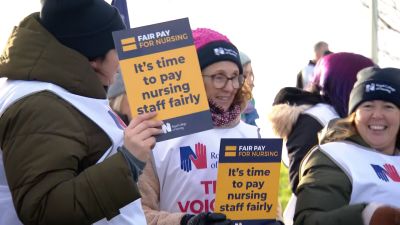Plaid Cymru announce income tax rise plans to fund pay increase for NHS workers

Income taxes in Wales would go up to fund an 8% pay rise for NHS workers under plans unveiled by Plaid Cymru.
The party will attempt to alter the Welsh Government’s budget next week to include the tax rises, something that Mark Drakeford has rejected because of the cost of living crisis.
It is proposing that Welsh rates of income tax should go up by 1p at the basic rate, 2p at the higher rate and 3p for the additional rate fund an 8% pay rise next year for NHS workers.
Party leader, Adam Price, says that would raise £317m to add to the Welsh Government budget. He says that money would pay for:
“A fairer pay increase of 8% next year for NHS workers, the first real terms pay rise in more than a decade”
A minimum wage of £12 an hour for care workers
“Addressing public sector pay pressures and a package of financial support for those in greatest need”
Plaid Cymru has today published an amendment to next week’s debate on the Welsh Government budget.
It will lead to a vote in the Senedd but is unlikely to succeed because the First Minister, Mark Drakeford, has repeatedly said that it would be unfair to put income tax up during a cost of living crisis.
He leads the largest group of Senedd members so they will almost certainly vote against the move.
Welsh Conservatives are opposed to any tax rises and have called Plaid Cymru's proposal "voodoo economics."
But speaking as he published the amendment, Adam Price said, “An unprecedented crisis calls for genuine solutions.
“Fair Pay for nurses will mean fair play for patients and what signal a real investment in our NHS, putting in place for the future the extra cash that would allow us to provide more financial support to those in greatest need, such as extending free school meals to secondary schools to help families, supporting people struggling to pay their mortgages or increasing the educational maintenance allowance that aims to help young people continue their education.
“While Westminster short changes us at every turn, the Welsh Government is not powerless. We have these powers at our disposal, it's time to use them.”
The Welsh Conservatives have strongly criticised Plaid Cymru's proposal. The party's Senedd leader, Andrew RT Davies said, “Plaid Cymru's so-called "co-operation agreement" with Labour is a coalition in all but name. If they really lacked faith in Labour ministers in the Senedd, they would stop propping them up.
“Instead, they're trying to have all the good things of government without taking responsibility. The result is typical voodoo economics from Plaid, trying to spend the same pound twice. “Under the UK Conservative Government, Wales gets £1.20 for every £1 spent in England. The money is there but Labour and Plaid mismanagement is short-changing Wales and our NHS.”
Currently people living and working in Wales pay exactly the same income rates as in England although those rates are actually split between tax collected by the Welsh Government and tax collected by the UK Government.
You don’t pay any income tax if you earn less than £12,570. This is known as the “basic rate.”
You pay 20% on anything you earn between £12,571 and £50,270.
Middle rate or “higher rate” taxpayers pay 40% of anything they earn between £50,271 and £150,000.
If you earn over £150,000 you come into the “additional rate” band and pay 45% of anything you earn over £150,00.
10p of each of those rates is collected by the Welsh Government and added to its overall budget.
The £317m increase estimated by Plaid Cymru still wouldn’t offset the effect of inflation which, according to Cardiff University's Wales Fiscal analysis team, will mean an effective reduction in spending power in the financial year 2023/24 of £800m.
The UK Government insists that Wales is well-funded.
Speaking in the Commons chamber recently, Welsh Secretary David TC Davies said "the overall funding amounts for the devolved administrations, including the Welsh Government, have still increased in real terms over the period despite the impact of inflation".
It was one of the biggest news stories of our time - and it's still not over. So what did Boris Johnson know about Downing Street’s notorious parties? With fresh revelations from our Number 10 sources, in their own words, listen to the inside story...